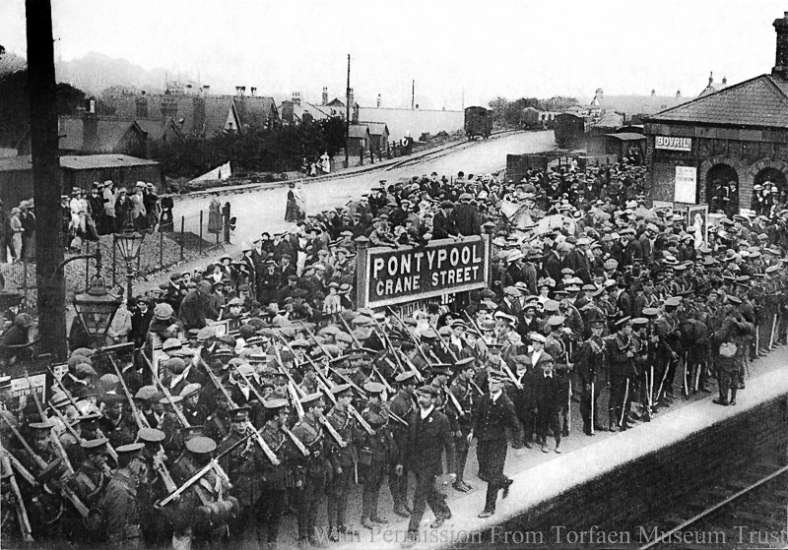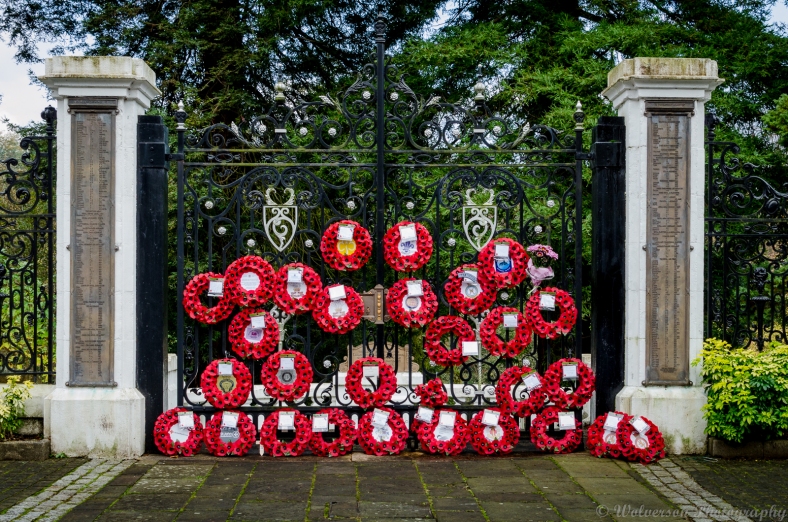Pontypool Remembrance Sunday 2014
Photographs of the Remembrance Sunday service at the war memorial on Hanbury Road, Pontypool, held at 12pm on 9th November, 2014.
Just over one hundred years ago, when Great Britain declared war on Germany, extraordinary scenes were witnessed in the homes and streets of Pontypool. Within a very short time of that declaration, the men of the 2nd Battalion, The Monmouthshire Regiment, had been uprooted from their homes and had left their families behind to fight overseas for King and Country.
In his book, Roll of Honour, W. G. Lloyd describes how a young man, who would later make the same journey, witnessed the departure of these men from Crane Street Railway Station that day, and how he remained astounded throughout the rest of his long life at the fact that his friends and the men he knew had gone in the blink of an eye; over the sea to die within a very short time.
This iconic photograph, believed to be of their departure from Crane Street Railway Station during the afternoon of Wednesday, 5th August 1914, is used with permission from Torfaen Museum Trust.

Crane Street Railway Station, Pontypool | 2nd Battalion, The Monmouthshire Regiment, Departing for the Front.
Lest we forget:-
A state of war between Great Britain and Germany began at 11pm, Tuesday, 4th August, 1914. And, in an instant, the streets of Pontypool became unnaturally busy.
The order came that night for the full mobilisation of A, B, and C Headquarters Companies of the 2nd Battalion, The Monmouthshire Regiment. Families underwent turmoil and disruption at their homes as local police notified Territorial soldiers to report for immediate duty at the Drill Hall, Osborne Road, Pontypool. Fathers and sons prepared in haste to join the constant stream of men heading for the hall to answer the King’s call of duty.
Colonel E. B. Cuthbertson, M. V. O., the commanding officer of the 2nd Battalion, Monmouthshire Regiment, observed a large crowd of distressed people gathering outside the Drill Hall as he arrived by motor vehicle late that night. Unfounded rumours had spread that the Regiment were to depart that night and relatives; mothers, wives – many with babies in their arms – were waiting anxiously outside the hall. Later, an official statement stating that the Monmouthshire Regiment would depart the next day sent these worried relatives home and back to their beds.
The crowd of people reassembled, early the next morning, with people eager for any news about that day’s proceedings. By 10 a.m., the three companies had mustered, and with the exception of a few men who were away on holiday, all of the 400 men of A, B & C Companies had reported to their respective senior officer.
Throughout the morning, the crowd of people continued to grow outside the Drill Hall. War fever and patriotism were rife amongst many male civilians. Young men volunteered their services for King and Country and were held in reserve. Shop keepers’ wagons were loaded with appropriate and abundant supplies for making camp. By the afternoon, the crowd had grown even larger as the time approached for the men to depart.
Lieutenant V. H. Watkins led the advanced party, consisting of twenty armed men with their bayonets fixed and three loaded wagons of baggage and ammunition. Part of the crowd followed them along Osborne Road, George Street, Commercial Street and then up to Crane Street Railway Station.
Meanwhile, the sound of the Pontypool Town Temperance Band could be heard approaching the Drill Hall. Their music had signaled that an historic event was about to take place and a great number of people left their homes to line the pavements of the route. Leading the way to Crane Street Railway Station, the band played military marches as Colonel Cuthbertson and his officers left their headquarters with the three companies of men, each man carrying two days-worth of rations. Spectators remained eerily quiet as the young men passed by, as if they had some foreknowledge of the horrors these men would soon be facing.
Several thousand people watched these men march onto the railway station platform before waiting almost three quarters of an hour for the special train to arrive. Many tried to spill onto the platform through police barricades; others found vantage points to observe proceedings from the railway bridge and the road at Park Terrace, which overlooked the station. Distraught wives cried uncontrollably, reaching across the railings that divided them to kiss their husbands goodbye. Most, now understanding the gravity of the situation, passed over their infants to receive, perhaps, one last kiss from their fathers.
The men of the Monmouthshire Regiment were in high spirits however; smiling, laughing, shaking each other’s hands and wishing each other good luck. As the train started to pull away from the station, last minute goodbyes were made as small family groups held on to the carriage doors for as long as they could. Under immense cheers from spectators and from the men themselves, the train steamed out of the railway station and was gone.
References & Notes:
- Roll of Honour – W. G. Lloyd.
- Image of the 2nd Battalion, The Monmouthshire Regiment on Crane Street Railway Station used with the kind permission of Torfaen Museum Trust, Pontypool Museum.
- The site of Crane Street Railway Station, Pontypool, is now occupied by Tesco.





















Thank you for a moving remembrance post today Tim.